Steve Bull's Blog, page 7
January 29, 2025
The Bulletin: January 23-29, 2025
Collapse or Extinction: The Unholy Double Bind of the 21st Century
US Will Likely Stop Buying Oil From Venezuela: Trump | The Epoch Times
The End of the Regenerative Illusion?
Germany’s Outgoing Economy Minister Warns Europe Not to Over-Rely on US Energy | The Epoch Times
Modern Civilization is Proving to be a Very Fragile Thing
Canada Can’t Afford To Play Trade Chicken With the US
Do Money Supply, Deficit And QE Create Inflation? – RIA
Deforestation and world population sustainability: a quantitative analysis | Scientific Reports
Storm Éowyn: man killed and 725,000 properties without power in Ireland
Misled Climate CO2 Fanatics – Green Energy Is a Road to Nowhere – Global Research
Medical Journal Article Criticises Corrupt Medical Journals
Visualizing Europe’s Dependence On Chinese Resources | ZeroHedge
Gazprom In Turmoil, Forced To Hike Prices On Russians In Middle Of Winter | ZeroHedge
Warming, cooling, or we don’t know?
Homo Sapiens Are Working Overtime to Join ‘The Great Silence’ | Collapse of Industrial Civilization
Where We’ve Been, Where We’re Going
When Renewables Meet Their Limits to Growth
Letter From a Young Canadian: Authoritarianism, Media Propaganda and Repression
World Economic Forum Panel Praises EU Censorship Law
Green Deception: Environmental Activists Serve China’s Energy Agenda | RealClearDefense
Climate change is disrupting food systems across Latin America, UN report says | CNN
‘Last Ice Area’ in the Arctic could disappear much sooner than previously thought
“Landman” vs. the Environmentalists | Mises Institute
2025: On the Brink of the Biggest Oil Shock in History – International Man
The Uncertain Future of Oil: Energy Poverty, Depletion, and ‘Green’ Ambitions
The Bulletin: January 23-29, 2024
Collapse or Extinction: The Unholy Double Bind of the 21st Century
US Will Likely Stop Buying Oil From Venezuela: Trump | The Epoch Times
The End of the Regenerative Illusion?
Germany’s Outgoing Economy Minister Warns Europe Not to Over-Rely on US Energy | The Epoch Times
Modern Civilization is Proving to be a Very Fragile Thing
Canada Can’t Afford To Play Trade Chicken With the US
Do Money Supply, Deficit And QE Create Inflation? – RIA
Deforestation and world population sustainability: a quantitative analysis | Scientific Reports
Storm Éowyn: man killed and 725,000 properties without power in Ireland
Misled Climate CO2 Fanatics – Green Energy Is a Road to Nowhere – Global Research
Medical Journal Article Criticises Corrupt Medical Journals
Visualizing Europe’s Dependence On Chinese Resources | ZeroHedge
Gazprom In Turmoil, Forced To Hike Prices On Russians In Middle Of Winter | ZeroHedge
Warming, cooling, or we don’t know?
Homo Sapiens Are Working Overtime to Join ‘The Great Silence’ | Collapse of Industrial Civilization
Where We’ve Been, Where We’re Going
When Renewables Meet Their Limits to Growth
Letter From a Young Canadian: Authoritarianism, Media Propaganda and Repression
World Economic Forum Panel Praises EU Censorship Law
Green Deception: Environmental Activists Serve China’s Energy Agenda | RealClearDefense
Climate change is disrupting food systems across Latin America, UN report says | CNN
‘Last Ice Area’ in the Arctic could disappear much sooner than previously thought
“Landman” vs. the Environmentalists | Mises Institute
2025: On the Brink of the Biggest Oil Shock in History – International Man
The Uncertain Future of Oil: Energy Poverty, Depletion, and ‘Green’ Ambitions
January 25, 2025
Today’s Contemplation: Collapse Cometh CXCVI–‘Renewable’ Energy: See, Hear, and Speak No Evil, Part 2

In Part 1 of this now three-part Contemplation (see Website, Medium, Substack) I introduced some of the claims made by ‘renewables’ cheerleaders. These include the two I attempted to unmask as false in the initial post: wars are not created as a result of them, and they do not pollute.
As I read the evidence, these assertions not only hide/ignore/rationalise away some uncomfortable negative consequences of our pursuit of ‘renewables’ but state the exact opposite of reality. The increasing and monumental ‘investments’ called for by ‘renewables’ supporters actually result in greater geopolitical competition (including war) over finite resources (including hydrocarbons) and significantly increases pollution of our planet–particularly due to the extractive and industrial processes required for their production.
Two additional assertions made by ‘renewables’ advocates need to be addressed: through their use security is improved; and, jobs are created through their production and thereby greater wealth is generated.
In this post I will deconstruct the claim that security is improved through the use of ‘renewables’.
Security is improved
The claim that security is improved with the use of ‘renewables’ hinges on several arguments. Among them is that energy sources are diversified (thereby making the power grid more resilient) and dependence upon imports is reduced.
I will first focus upon the claim that “import dependence is reduced” and thus improves national ‘security’ through increased independence.
Again, as with all the other claims, this one depends mostly upon one’s perspective and could be argued to be accurate (if you can ignore some inconvenient facts) but only after the first generation of ‘renewables’ have been produced and distributed–leaving unsaid, of course, what occurs after the limited lifespan of this first generation of ‘renewables’ reaches its end.
Our globalised markets are greatly intertwined and co-dependent. While there has been a great clamour by some politicians to bring all industry back to their own nations–and some limited amount of this has occurred–this not only can take years/decades to accomplish but the more daunting reality is that many nations do not have the local/domestic materials/minerals to be able to carry this relocalisation dream out completely independent of others. A reindustrialisation of nations would still depend very significantly upon the importation of materials/minerals not present or economically-feasible to extract and/or refine within a country’s own borders.
There are few widely-scaled and industrial-based products that draw their materials and/or component parts from solely national, let alone local, sources. They depend upon sourcing such materials and parts from across the globe, some within their own national borders but very many not and must be imported (see graphic below that shows the growth rate in exports/imports–all have grown and are expected to continue to grow).
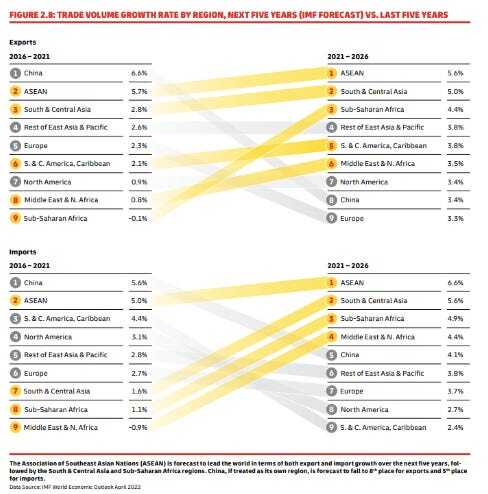 Source
SourceOne cannot wave a magic wand and make rare minerals or other required resources appear in one’s backyard, or make the refining of such minerals/material economically-viable within their nation. For example, almost all US oil refining is geared towards heavy, sour crude oil that it mostly imports from Canada, Mexico, and the Persian Gulf region; and the light, sweet oil that is increasingly dominating US extraction must be shipped elsewhere to be refined–primarily to Canada, Mexico, and Europe.
Focussing for the moment just upon solar photovoltaic energy, close to 95% of the world’s panels are manufactured by China (78%) and a number of nearby Asia-Pacific nations (15.3%). There are a number of reasons for this but it primarily rests upon the economic aspects that make it far more profitable to produce panels in China and nearby regions. For example, China has far more lax environmental protection laws so that the ecologically-destructive industrial processes necessary to produce panels are less expensive, and remuneration for workers is far less than that in so-called ‘advanced’ economies.
Looking at the materials/minerals required for solar panels, China also significantly dominates the source locations for the extraction and the refining of these, including: silicon, indium, tellurium, gallium, copper, and zinc. This is not to suggest other nations do not extract and refine these, but not to the extent China currently does. And without decimating environmental regulations, greatly reducing remuneration, and/or investing significantly in necessary infrastructure in those other nations that may hold some significant quantities of reserves, the far less expensive Chinese sources will continue to dominate the global market–at least for the foreseeable future; this may change down the road but it is not what currently takes place.
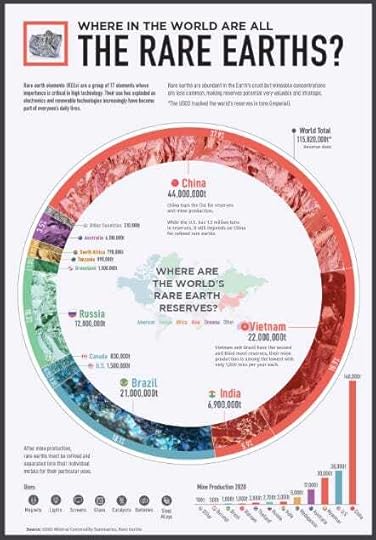
And then there are the hydrocarbon inputs that are required to extract, refine, and distribute the necessary minerals and materials–to say little about such inputs into the manufacturing of the panels (see Part 1). Hydrocarbon imports are important for almost all nations, either because they have no domestic resources and/or no refining capacity. Even some of the largest oil ‘producers’ still require imports if their resources (e.g., light shale oil) do not match their needs (e.g., fuel oil, diesel) as highlighted above.
To claim that the use of ‘renewables’ decreases dependency upon imports is completely inconsistent with reality. (NOTE: the off-shoring of the ecologically-destructive and polluting processes to produce panels also contributes to the mythos in most (all?) so-called ‘advanced’ economies that ‘renewables’ are ‘clean/green’.)
Now, one could argue that once the initial importing of panels via the global market is accomplished the goal of independence is achieved. Perhaps. What happens, however, when the first generation of these products reaches the end of their lifespan?
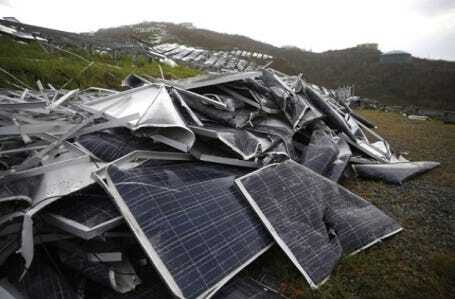
Recycling the products in some form of a ‘regenerative/circular’ cycle is put forward as the ‘solution’ to this. What is left out of this suggestion are two major roadblocks. First, some components are extremely difficult if not impossible to recycle due to their manufacturing processes–for example, in solar panels: silicon wafers, polymer layers, thin-film materials; in wind turbines: the massive blades composed of fiberglass or carbon fiber reinforced with resin. Second, recycling is extremely energy-intensive, results in significant pollutants/toxins, and the thermodynamic law of entropy assures loss of material/minerals with each and every generation of recycling. Recycling is no ‘solution’.
So, there is not only a need to scale-up significantly the production of ‘renewables’ to achieve the ‘clean’ energy utopia, but to scale-up massively the recycling and, in fact, to figure out how to recycle all the components–as most components have yet to be recyclable (or economically so). Unfortunately, the majority of ‘renewables’ end up in landfills. This is the reality of ‘clean/green renewables’.
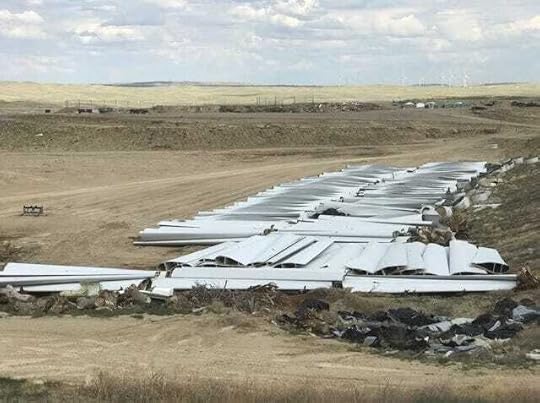
It is nonsensical to argue at this time that the adoption of ‘renewables’ decreases greatly/eliminates dependence upon imports. In fact, the opposite is quite true given the scaling up being discussed by ‘renewables’ advocates. Massive hydrocarbon and mineral inputs are required and mostly come from other nations via imports.
That energy sources are diversified by their use seems undebatable. The greater the number of energy sources employed, the greater the diversification. Yes, adding ‘renewables’ to the world’s other energy sources has created an increasing variety of sources, but not in the replacement fashion many hope for–’renewables’ have been additive to the globe’s energy consumption.

But does having diversified energy sources feeding into a society’s power grid improve security of the system in terms of resilience?
As with most things there are pros and cons to such diversification. Let me focus on the cons as they tend to be left unsaid by ‘renewables’ cheerleaders.
First, adding these additional technologies increases the system’s complexity along with its fragility. Systems that become more complex also become more fragile due to introduced vulnerabilities that include the need for increased maintenance and management, increased reliance upon computer systems, increased ‘costs’, and increased integration of various subsystems that can lead to cascading failures when a problem occurs–the blackout of 2003 that impacted more than 55 million users in northeast North America is a prime example, where it was determined a software ‘bug’ failed to alert operators of a need to redistribute power load when lines in Ohio came into contact with nearby foliage; the resulting power surge spread and caused the shutdown of 508 generating units at 265 power plants, and a subsequent loss of power load of about 80% that took several days to rectify1.

Second, the issue of intermittency is significant to any discussion of grid resilience since it is vital that the power load on any electrical network must be balanced immediately with the supply being generated–damage to systems can occur (and lead to cascading failure) if load and supply are not matched precisely.
Wind and solar photovoltaic in particular are intermittent in their harvesting of energy. This intermittency requires a back-up system to provide a constant flow of energy as demanded by our various electrical energy-dependent complexities. The alternative, on-demand systems are mostly hydrocarbon-based, with a handful of massive energy-storage systems (usually battery), that can be called upon at a moment’s notice.
It should be noted that these back-up systems also carry with them further ecological destruction due to the extractive nature of their production. But such systems are integral to ‘renewables’; you cannot have one without the other. And the integration of these subsystems increase the complexity and fragility of the larger electrical power system as discussed above.
Adding complexity to a system, particularly one that is electronic in nature, introduces more and more vulnerabilities and a risk of cascading failures. So, rather than increasing security it would seem that security is decreased with the introduction of diversified energy sources that require complex interconnectivity and management.
And then there’s the level of national/state security and the whole conundrum of resource scarcity, competition over these, and the wars that can and often do result (see Part 1). Such competition over finite resources does the opposite of ensuring security and exposes entire nations to increased insecurity–with the political responses to such issues being to ramp up ‘investments’ in national militaries and associated armament stockpiles furthering resource scarcity due to their monumental ‘costs’ in terms of mineral/material needs (including many that are also necessary for ‘renewables’).
Once again, the reality seems to be the opposite of the supposed beneficial claim: security is not increased due to the pursuit of ‘renewables’ but is actually decreased.
In Part 3 I will discuss the final claim made by ‘renewables’ advocates: jobs are created through their production and thereby greater wealth is generated.
What is going to be my standard WARNING/ADVICE going forward and that I have reiterated in various ways before this:
“Only time will tell how this all unfolds but there’s nothing wrong with preparing for the worst by ‘collapsing now to avoid the rush’ and pursuing self-sufficiency. By this I mean removing as many dependencies on the Matrix as is possible and making do, locally. And if one can do this without negative impacts upon our fragile ecosystems or do so while creating more resilient ecosystems, all the better.
Building community (maybe even just household) resilience to as high a level as possible seems prudent given the uncertainties of an unpredictable future. There’s no guarantee it will ensure ‘recovery’ after a significant societal stressor/shock but it should increase the probability of it and that, perhaps, is all we can ‘hope’ for from its pursuit.
If you have arrived here and get something out of my writing, please consider ordering the trilogy of my ‘fictional’ novel series, Olduvai (PDF files; only $9.99 Canadian), via my website or the link below — the ‘profits’ of which help me to keep my internet presence alive and first book available in print (and is available via various online retailers).
Attempting a new payment system as I am contemplating shutting down my site in the future (given the ever-increasing costs to keep it running).
If you are interested in purchasing any of the 3 books individually or the trilogy, please try the link below indicating which book(s) you are purchasing.
Costs (Canadian dollars):
Book 1: $2.99
Book 2: $3.89
Book 3: $3.89
Trilogy: $9.99
Feel free to throw in a ‘tip’ on top of the base cost if you wish; perhaps by paying in U.S. dollars instead of Canadian. Every few cents/dollars helps…
https://paypal.me/olduvaitrilogy?country.x=CA&locale.x=en_US
If you do not hear from me within 48 hours or you are having trouble with the system, please email me: olduvaitrilogy@gmail.com.
You can also find a variety of resources, particularly my summary notes for a handful of texts, especially William Catton’s Overshoot and Joseph Tainter’s Collapse of Complex Societies: see here.
AND
Released September 30, 2024
It Bears Repeating: Best Of…Volume 2
A compilation of writers focused on the nexus of limits to growth, energy, and ecological overshoot.
With a Foreword by Erik Michaels and Afterword by Dr. Guy McPherson, authors include: Dr. Peter A Victor, George Tsakraklides, Charles Hugh Smith, Dr. Tony Povilitis, Jordan Perry, Matt Orsagh, Justin McAffee, Jack Lowe, The Honest Sorcerer, Fast Eddy, Will Falk, Dr. Ugo Bardi, and Steve Bull.
The document is not a guided narrative towards a singular or overarching message; except, perhaps, that we are in a predicament of our own making with a far more chaotic future ahead of us than most imagine–and most certainly than what mainstream media/politics would have us believe.
Click here to access the document as a PDF file, free to download.
I recall with precision the moment the power grid went down at our home. I was working on a table saw in our garage when it suddenly stopped. Having borrowed my brother-in-law’s saw (as mine had ‘died’ the day before while I was working on a home project), I feared I had just done something to cause the borrowed saw to cease operation. I checked the cord of the saw and then our house fuse box. For a few moments I believed that I had caused the outage for our home. It wasn’t for some time that it became apparent that there was something broader afoot…I still tell people the blackout was all my fault.
January 22, 2025
The Bulletin: January 16-22, 2025
Visualizing All Of Canada’s Cancelled Energy Projects | ZeroHedge
Geological Events Show the Difference Between Predicaments and Problems
The Everything Bubble Suddenly Feels Unstable
The War Behind The War: What World War III Is Really Being Fought Over | ZeroHedge
Preventable Deaths And Vitamin D3 | ZeroHedge
Greece Calls On EU For Fast Response To Surging Energy Prices
Drill, Baby, Drill – Waking Up in the Age of Absurdity
Norway warns its oil and gas production is in decline
None Of These War Criminals Will Face Justice As Long As the US Empire Exists
Firecraft Guide Part I: Tindering the Flame
Climate, Net Zero and Other Words You Must Stop Using
Giant freshwater aquifer in southern Africa is under threat from mining
Greenland’s melting ice is clearing the way for a mineral ‘gold rush’
Is Digitization Catastrophic for Civilization?
Climate Fatigue: Why the Story of Saving the Planet Isn’t Selling | Art Berman
The Red Giant – The Honest Sorcerer
Every Large Economy on Earth is Shrinking
The Imp with a Chainsaw – by Ugo Bardi – The Seneca Effect
How to Survive a Pre-Collapse Dystopia: a Conceptual Segmentation – George Tsakraklides
Resource Insights: Wishful thinking? Sweden building nuclear waste site to last 100,000 years
Trump To Declare National Energy Emergency | ZeroHedge
Questioning lithium-ion batteries, fire risks & hydrating dry regions
Extremes Become More Extreme, Then Revert to the Mean
Trump, Musk, Gaza, the Rise of Totalitarianism and the End of the US Empire
Decisions, Decisions | Do the Math
Donald Trump Is The Empire Unmasked – by Caitlin Johnstone
After millennia as CO₂ sink, more than one-third of Arctic-boreal region is now a source
Heat waves could worsen as soil moisture changes, climate models reveal
Unprecedented winter storm paralyzes Gulf Coast with record-breaking snow even in Florida | CNN
‘Catastrophic’: Great Barrier Reef hit by its most widespread coral bleaching, study finds
Alberta government lifts ban on coal exploration in Eastern Slopes | CBC News
Direction of Global Crises to Depend on Trump’s Next Steps, Russia’s Lavrov Says | The Epoch Times
PJM Grid Declares “Max Generation Alert” As Polar Vortex Unleashes Mini Ice Age | ZeroHedge
The Bulletin: January 16-22, 2024
Visualizing All Of Canada’s Cancelled Energy Projects | ZeroHedge
Geological Events Show the Difference Between Predicaments and Problems
The Everything Bubble Suddenly Feels Unstable
The War Behind The War: What World War III Is Really Being Fought Over | ZeroHedge
Preventable Deaths And Vitamin D3 | ZeroHedge
Greece Calls On EU For Fast Response To Surging Energy Prices
Drill, Baby, Drill – Waking Up in the Age of Absurdity
Norway warns its oil and gas production is in decline
None Of These War Criminals Will Face Justice As Long As the US Empire Exists
Firecraft Guide Part I: Tindering the Flame
Climate, Net Zero and Other Words You Must Stop Using
Giant freshwater aquifer in southern Africa is under threat from mining
Greenland’s melting ice is clearing the way for a mineral ‘gold rush’
Is Digitization Catastrophic for Civilization?
Climate Fatigue: Why the Story of Saving the Planet Isn’t Selling | Art Berman
The Red Giant – The Honest Sorcerer
Every Large Economy on Earth is Shrinking
The Imp with a Chainsaw – by Ugo Bardi – The Seneca Effect
How to Survive a Pre-Collapse Dystopia: a Conceptual Segmentation – George Tsakraklides
Resource Insights: Wishful thinking? Sweden building nuclear waste site to last 100,000 years
Trump To Declare National Energy Emergency | ZeroHedge
Questioning lithium-ion batteries, fire risks & hydrating dry regions
Extremes Become More Extreme, Then Revert to the Mean
Trump, Musk, Gaza, the Rise of Totalitarianism and the End of the US Empire
Decisions, Decisions | Do the Math
Donald Trump Is The Empire Unmasked – by Caitlin Johnstone
After millennia as CO₂ sink, more than one-third of Arctic-boreal region is now a source
Heat waves could worsen as soil moisture changes, climate models reveal
Unprecedented winter storm paralyzes Gulf Coast with record-breaking snow even in Florida | CNN
‘Catastrophic’: Great Barrier Reef hit by its most widespread coral bleaching, study finds
Alberta government lifts ban on coal exploration in Eastern Slopes | CBC News
Direction of Global Crises to Depend on Trump’s Next Steps, Russia’s Lavrov Says | The Epoch Times
PJM Grid Declares “Max Generation Alert” As Polar Vortex Unleashes Mini Ice Age | ZeroHedge
January 15, 2025
The Bulletin: January 9-15, 2025
The Falsification of Everything | how to save the world
Emissions Are SO Not the Only Problem with Cars
Rhyming History: Weimar Germany’s Hyperinflation
At least 6 dead, more than 300 000 without power as major winter storm sweeps through U.S.
Net Energy Cliff & the Collapse of Civilization
Quarter of Freshwater Animals Face Extinction, New Study Warns – Newsweek
Arresting and Killing Greenies: Targeting Climate Change Protests – Global Research
The Science of Anti-Russian Propaganda – by Glenn Diesen
Decoupling what!? – by Gunnar Rundgren
One Way or Another, the World is Headed for a Degrowth Future | by Doug Bierend
The UK’s Strange Collapse – John Rubino’s Substack
Positioned For a Historic Crash – The Daily Reckoning
Natural Gas Production is Contracting
The blackouts are coming – by Elisabeth Robson
The Energy March of Folly | Art Berman
Government Spending Will Cause the Next Financial Crisis | Mises Institute
America’s Great Climate Migration Has Begun. Here’s What You Need to Know. | Columbia Magazine
From Crisis to Connection: Why Radio is the Lifeline You Need to Learn Now
#296: Predicament, not outcome | Surplus Energy Economics
Escobar: Empire Of Chaos, Reloaded | ZeroHedge
The Human Souffle – The Honest Sorcerer
Oh, You What the world needs now is directions for reducing our dependence on technology
Grabbing Greenland’s Oil. But does it Exist? – by Ugo Bardi Mean THAT Democracy | how to save the world
The adverse, long-term health effects of wildfires
Have You Been Faked Out by the Panama-Canada-Greenland Syndrome? – Global Research
What If Tech, the Market and the State Are No Longer Solutions?
Russia, Iran To Sign ‘Comprehensive Strategic Partnership’ Treaty This Week | ZeroHedge
Extreme rainfall leaves 10 dead in Ipatinga, Minas Gerais, Brazil – The Watchers
Thrust Into Power: A Thought Experiment | how to save the world
Never Mind the Propaganda, the World Should Know About America’s Countless Wars – Global Research
Chapter 3 – How energy and natural resources inhibit growth
Los Angeles burns: What you need to know
Credit Card Default Wave Hits U.S. Banks
2025: The Year the Federal Debt Bubble Bursts – International Man
The Bulletin: January 9-15, 2024
The Falsification of Everything | how to save the world
Emissions Are SO Not the Only Problem with Cars
Rhyming History: Weimar Germany’s Hyperinflation
At least 6 dead, more than 300 000 without power as major winter storm sweeps through U.S.
Net Energy Cliff & the Collapse of Civilization
Quarter of Freshwater Animals Face Extinction, New Study Warns – Newsweek
Arresting and Killing Greenies: Targeting Climate Change Protests – Global Research
The Science of Anti-Russian Propaganda – by Glenn Diesen
Decoupling what!? – by Gunnar Rundgren
One Way or Another, the World is Headed for a Degrowth Future | by Doug Bierend
The UK’s Strange Collapse – John Rubino’s Substack
Positioned For a Historic Crash – The Daily Reckoning
Natural Gas Production is Contracting
The blackouts are coming – by Elisabeth Robson
The Energy March of Folly | Art Berman
Government Spending Will Cause the Next Financial Crisis | Mises Institute
America’s Great Climate Migration Has Begun. Here’s What You Need to Know. | Columbia Magazine
From Crisis to Connection: Why Radio is the Lifeline You Need to Learn Now
#296: Predicament, not outcome | Surplus Energy Economics
Escobar: Empire Of Chaos, Reloaded | ZeroHedge
The Human Souffle – The Honest Sorcerer
Oh, You What the world needs now is directions for reducing our dependence on technology
Grabbing Greenland’s Oil. But does it Exist? – by Ugo Bardi Mean THAT Democracy | how to save the world
The adverse, long-term health effects of wildfires
Have You Been Faked Out by the Panama-Canada-Greenland Syndrome? – Global Research
What If Tech, the Market and the State Are No Longer Solutions?
Russia, Iran To Sign ‘Comprehensive Strategic Partnership’ Treaty This Week | ZeroHedge
Extreme rainfall leaves 10 dead in Ipatinga, Minas Gerais, Brazil – The Watchers
Thrust Into Power: A Thought Experiment | how to save the world
Never Mind the Propaganda, the World Should Know About America’s Countless Wars – Global Research
Chapter 3 – How energy and natural resources inhibit growth
Los Angeles burns: What you need to know
Credit Card Default Wave Hits U.S. Banks
2025: The Year the Federal Debt Bubble Bursts – International Man
January 12, 2025
Today’s Contemplation: Collapse Cometh CXCV–‘Renewable’ Energy: See, Hear, and Speak No Evil, Part 1

A recent post on environmentalism as a meme states that ‘renewable’ energy supporters hold that these technologies solve some significant problems that humanity faces.
‘Renewable’ energy enthusiasts claim the following: wars are not created as a result of them; they fight pollution; and through their use security is improved, jobs are created, and wealth is generated.
Each of these beliefs about ‘renewables’ could be argued to hold some ‘truth’ and be construed as positive, depending entirely upon one’s perspective. I would argue, however, that this perspective is relatively narrow and ignores much of the complexity surrounding our energy production, use, and especially the negative consequences that arise from such production and use.

I believe that these perceptions about renewables and the amplification of them by their cheerleaders feed into the monster that is the mythos (and false hope) around modern complex society ‘sustainability’ and a pending energy ‘transition’.
Let me deconstruct each of these ideas on our ‘renewable energy transition’ and its associated industrial technologies over this and my next Contemplation.
Claim #1: Wars are not created as a result of them
Implicit in this first view is that wars have and are arising from societal competition over the energy source that ‘renewables’ are seeking to ‘replace’: hydrocarbons. I cannot disagree whatsoever with this implication: wars have and are occuring as a result of attempts to gain control over hydrocarbon resources.
Although not typically admitted by governments and/or a region’s ruling elite, there is plenty of evidence to support the argument that resources in general are a significant contributing factor to kinetic wars; they rarely, if ever, arise due to the reasons typically promoted by nations as they seek to garner the support of their citizens for military engagements. Our elite wish the masses to buy into the belief that wars are fought almost exclusively over moral issues–to simplify: good versus evil. It is just coincidental that those evil ‘others’ tend to be in possession of lands that hold lots of natural resources, such as: water, timber, fishing grounds, arable farmland, precious metals and gemstones, rare-earth minerals, hydrocarbons, and/or uranium.
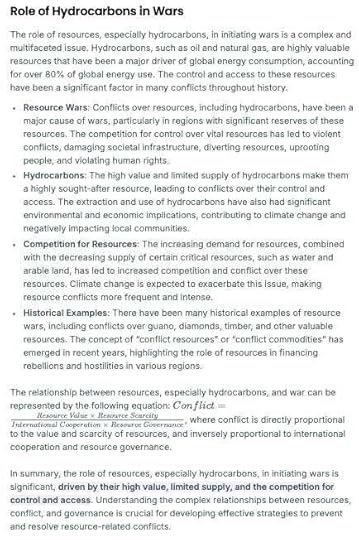
Brave AI-generated summary
It can be stated with fair certainty that for the past 50+ years many wars have been fought over our industrial societies’ master resource: hydrocarbons. This appears particularly obvious when one considers the geopolitical gamesmanship surrounding the Middle East over this time, including a number of hot wars and the petrodollar deal between the United States and Saudi Arabia struck in 1974. And it is probably not coincidental that the increase in such wars and machinations occurred not long after the U.S. Empire passed its peak in cheap, conventional crude oil in 1970 (just as predicted by petroleum geologist Marion King Hubbert in 1956).
For a current example, one need look no further than the decade-old U.S. invasion and occupation of hydrocarbon-rich regions of Syria. (Interesting, isn’t it, how the sovereignty and border integrity of some nation states is unimportant or simply ignored, while for others it’s worth ‘investing’–with probably a lot of money laundering–billions/trillions of dollars and risking many lives. Can you say double standard? Perhaps it’s because that ‘evil’ Syrian government happened to be controlling an area with ‘our’ oil.)
Regardless, it seems obvious that competition over hydrocarbon reserves results in war.

But the production and use of ‘renewables’ won’t result in wars? Let’s glance behind the curtain for a moment to unpack this initial claim.
First of all–and although die-hard techno-optimists/ecomodernists may deny/ignore/dispute the following–’renewables’ depend upon significant inputs of hydrocarbons for their production, distribution, maintenance, and reclamation/disposal. Despite extremely small-scale examples of power derived via ‘renewables’ to carry out these processes (but greatly amplified by ‘renewables’ cheerleaders), huge amounts of hydrocarbons are indispensable to the supposed energy ‘transition’. Almost all the important industrial processes required to produce ‘renewables’ need hydrocarbons to power them.
And if we are to attempt what some are calling for–a ‘war-footing’ investment in a massive rollout of ‘renewables’–then one hell of a lot of hydrocarbons are required; probably more than can be garnered from existing global reserves for the scale of such a feat. And remember scale is significantly important to any energy ‘transition’ that depends upon ‘renewables’ since the electricity generated by these technologies accounts for only a smallish amount of the current power needs of modern, industrial societies–to say little about growing energy demands due to the ongoing pursuit of the perpetual growth chalice and the globe’s increasing population.
A very significant portion of humanity’s primary energy needs is still met by way of hydrocarbons–more than 80%. To replace our current demands (ignore for the moment that these demands keep growing–just think about the energy needs being bandied about for Artificial Intelligence and data centres) would require gargantuan numbers of solar panels, and/or wind turbines, and/or nuclear power plants.
For example, to replace the electricity portion of our energy demands (remember that hydrocarbons are used for much more than just electricity production) via ‘renewables’ would require tens of millions of solar panels, and/or many millions of wind turbines to be produced, and/or thousands of nuclear power plants to be constructed.
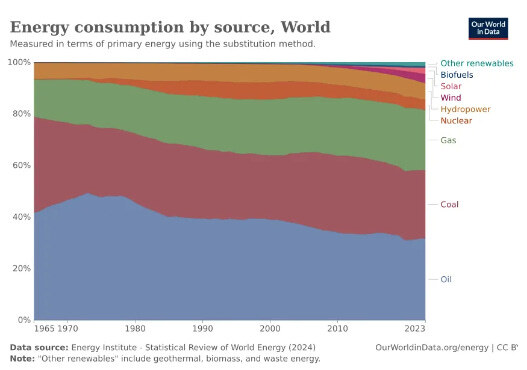
So the initial glitch in the ‘wars are not created as a result of them’ claim is that if wars are created as a result of competition over hydrocarbon resources and hydrocarbon resources are necessary for the creation (and re-creation) of ‘renewables’, then wars are indeed created as a result of them–their production necessitates that the competition/wars over hydrocarbons continue. And such competition would need to ramp up very significantly given the scale of ‘renewables’ being clamoured for and the hydrocarbons that would be needed.
The second major glitch for this ‘no war’ claim is stumbled upon once one is aware that ‘renewables’ also require a number of other finite and rare-earth mineral resources for their production. And the concentrated deposits of these minerals do not occur in equitable distributions across the planet. Some of those evil ‘others’ happen to be sitting on the lands that hold the minerals we need for our ‘renewables’. Oops…talk about bad planning.
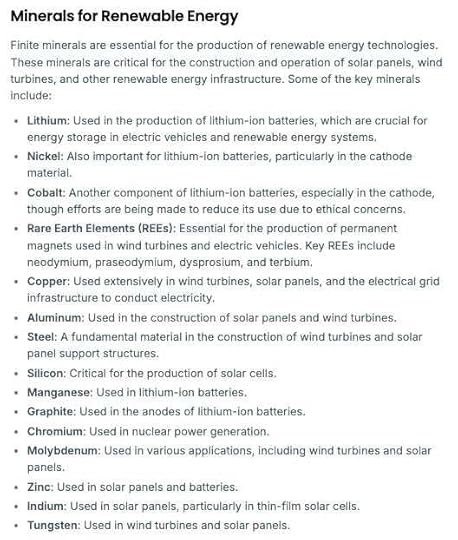
And then there’s the ‘warfare’ being waged upon the peoples of some of the mineral-rich regions (particularly nations with emerging or developing economies) who are stripped of rights, forcibly removed/relocated, required to work under less-than-ideal circumstances, increasingly exposed to pollutants/toxins, etc.. To say little about the ‘war’ waged against our ecosystems by the pursuit of ‘renewables’ (see below for more on this aspect).
Our species has been carrying out the brutal phenomenon of war for millennia prior to the use of hydrocarbons and I have little doubt that this is not going to halt, dissipate, or even be reduced through the adoption of ‘renewables’ as the notion implies. In fact, quite the opposite may be true if ruling elites across the globe believe that their wealth, control, and prestige are in jeopardy because somewhere and someone else has the resources required to ‘power’ via ‘renewables’ their lifestyles and fiefdoms (or at least line their pockets with the wealth being funnelled into the ‘electrify everything’ racket).
In fact, societal competition over regions of the planet that hold some of the mineral resources listed above as needed for ‘renewables’ started decades ago and can only get worse as we have already draw down a lot of the lowest-hanging fruit (i.e., best deposits) of these finite materials.
So, sorry, not sorry; if wars are fought over resources that are perceived as being necessary for a society’s energy needs, then the claim that wars are not fought as a result of ‘renewables’ is completely and utterly erroneous. To argue that wars are not created as a result of ‘renewables’ being produced and used completely ignores reality through some significantly darkly-shaded blinders.
Claim #2: They fight pollution
This is perhaps the most obviously misinformed assertion made by ‘renewables’ promoters. While within a narrow, keyhole perspective–focussed upon the lack of carbon emissions produced once the technologies have been manufactured and distributed–this may be accurate, such a statement completely ignores the massive ecologically-destructive mining required for the extraction and refinement of the minerals that help to create these technologies. It also overlooks the significant hydrocarbon inputs and their contribution to pollution of our ecosystems.
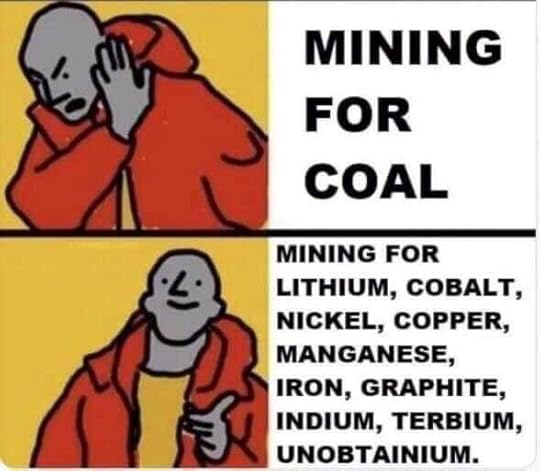
Mining is amongst the most polluting and destructive endeavours that humans engage in. To ignore this required activity in the production of ‘renewables’ technologies and then maintain that ‘renewables’ do not pollute is completely outlandish (bullshit, actually). But this fantastical belief is held tightly by many (most?) who assert that ‘renewables’ are and the energy ‘transition’ will be ‘clean/green’. This doesn’t just ignore reality, it distorts it beyond belief.
Some attempt to rationalise such destructive activities suggesting they are a one-off and everything is ‘clean/green’ once the products are manufactured. But this too ignores a lot. It ignores two very important facts: ‘renewables’ have a limited lifespan and/or can malfunction needing replacement; and, ‘recycling’ does not and cannot reclaim all the materials in them to ‘recreate’ them without more mining, to say little about the tremendous energy costs of recycling and pollutants/toxins that arise from the process.
This rationalisation also ignores the already overloaded planetary sinks and their increasing inability to absorb more pollutants/toxins. And the pollution and toxins that would be released into our ecosystems by the scale of ‘renewables’ production some are calling for would be monumental. Absolutely monumental.
Also keep in mind that the estimates provided above for how many solar panels and/or wind turbines would be required to replace the hydrocarbon-produced electricity that our complex societies demand do not take into account the number of additional panels or turbines that would be required to make up for the intermittency of these technologies. The sun only shines for a limited number of hours per day, and/or can encounter very cloudy or snowy conditions for many locations, and sometimes the wind doesn’t blow.
Then there are the massive and unprecedented battery storage facilities that would be required to store harvested energy for use when the sun is not shining or the wind is not blowing. The negative impact upon our ecosystems from the production (that also require massive finite and rare-earth minerals via mining), use of, and reclamation/disposal of batteries would also be tremendously monumental.
Add on top of these ‘roadblocks’ to some ‘green/clean’ utopian future the infrastructure build-out that would be required to support all this ‘electrification of everything’ and the replacement of all those hydrocarbon-dependent technologies and the impact on our ecosystems is beyond comprehension.
Just as they do not reduce the drawdown of hydrocarbons and their use but add to them, ‘renewables’ do not ‘fight’ pollution–they exacerbate it, significantly. To maintain that ‘renewables’ fight pollution is probably even more outrageously egregious than holding that they don’t result in war.

I close Part 1 of this Contemplation with a section of Charles Hugh Smith’s latest book–The Mythology of Progress, Anti-Progress and a Mythology for the 21st Century–that highlights the lore surrounding ‘clean’ technology:
The Mythology of ‘Clean Technology’
“The disconnect between the inspirational, make-believe story of Progress and the real world reaches its most jarring extreme in the mythology of clean technology, which imagines a wondrous utopia of clean skies and clean air delivered by clean technology.
The mythology neatly ignores the polluted air, ravaged landscape and exploited workers of the developing world nations that are being torn apart for the minerals needed to build the supposedly clean technologies for the wealthy developed nations.
This is mythology at its most appalling, a bizarre myopia to the dreadful environmental destruction and human suffering caused by wealthy nations’ stripmining developed nations for the resources needed for hundreds of millions of batteries, copper for expanding the electrical grid and all the other ‘clean technologies’ that are only ‘clean’ because wealthy nations have offloaded all the poisoned air and water, environmental damage and poor health onto the developing nations–the penultimate expression of the asymmetry of the global power structure created by the mythology of Progress.
‘Clean technology’ is nothing more than the distorted, self-serving fantasy of the wealthy exploiting the powerless for their own pleasures and profits. The clean skies and electric bikes of Amsterdam and dozens of other developed-world capitals come not from clean technology but from the exploitation of the planet and the powerless in distant lands, far from the clean skies and profits of the powerful and wealthy.” (pp. 168-169)
See also this recent article in The Tyee by Andrew Nikiforuk on the ‘energy transition’ arguing that there is no energy ‘revolution’, only addition to our growing energy use.
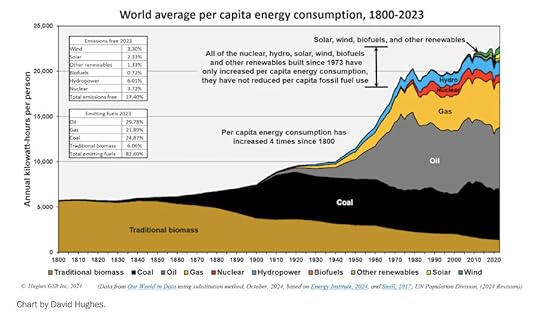
What is going to be my standard WARNING/ADVICE going forward and that I have reiterated in various ways before this:
“Only time will tell how this all unfolds but there’s nothing wrong with preparing for the worst by ‘collapsing now to avoid the rush’ and pursuing self-sufficiency. By this I mean removing as many dependencies on the Matrix as is possible and making do, locally. And if one can do this without negative impacts upon our fragile ecosystems or do so while creating more resilient ecosystems, all the better.
Building community (maybe even just household) resilience to as high a level as possible seems prudent given the uncertainties of an unpredictable future. There’s no guarantee it will ensure ‘recovery’ after a significant societal stressor/shock but it should increase the probability of it and that, perhaps, is all we can ‘hope’ for from its pursuit.
If you have arrived here and get something out of my writing, please consider ordering the trilogy of my ‘fictional’ novel series, Olduvai (PDF files; only $9.99 Canadian), via my website or the link below — the ‘profits’ of which help me to keep my internet presence alive and first book available in print (and is available via various online retailers).
Attempting a new payment system as I am contemplating shutting down my site in the future (given the ever-increasing costs to keep it running).
If you are interested in purchasing any of the 3 books individually or the trilogy, please try the link below indicating which book(s) you are purchasing.
Costs (Canadian dollars):
Book 1: $2.99
Book 2: $3.89
Book 3: $3.89
Trilogy: $9.99
Feel free to throw in a ‘tip’ on top of the base cost if you wish; perhaps by paying in U.S. dollars instead of Canadian. Every few cents/dollars helps…
https://paypal.me/olduvaitrilogy?country.x=CA&locale.x=en_US
If you do not hear from me within 48 hours or you are having trouble with the system, please email me: olduvaitrilogy@gmail.com.
You can also find a variety of resources, particularly my summary notes for a handful of texts, especially William Catton’s Overshoot and Joseph Tainter’s Collapse of Complex Societies: see here.
AND
Released September 30, 2024
It Bears Repeating: Best Of…Volume 2
A compilation of writers focused on the nexus of limits to growth, energy, and ecological overshoot.
With a Foreword by Erik Michaels and Afterword by Dr. Guy McPherson, authors include: Dr. Peter A Victor, George Tsakraklides, Charles Hugh Smith, Dr. Tony Povilitis, Jordan Perry, Matt Orsagh, Justin McAffee, Jack Lowe, The Honest Sorcerer, Fast Eddy, Will Falk, Dr. Ugo Bardi, and Steve Bull.
The document is not a guided narrative towards a singular or overarching message; except, perhaps, that we are in a predicament of our own making with a far more chaotic future ahead of us than most imagine–and most certainly than what mainstream media/politics would have us believe.
Click here to access the document as a PDF file, free to download.
Today’s Contemplation: Collapse Cometh CXCVI–‘Renewable’ Energy: See, Hear, and Speak No Evil, Part 1

A recent post on environmentalism as a meme states that ‘renewable’ energy supporters hold that these technologies solve some significant problems that humanity faces.
‘Renewable’ energy enthusiasts claim the following: wars are not created as a result of them; they fight pollution; and through their use security is improved, jobs are created, and wealth is generated.
Each of these beliefs about ‘renewables’ could be argued to hold some ‘truth’ and be construed as positive, depending entirely upon one’s perspective. I would argue, however, that this perspective is relatively narrow and ignores much of the complexity surrounding our energy production, use, and especially the negative consequences that arise from such production and use.

I believe that these perceptions about renewables and the amplification of them by their cheerleaders feed into the monster that is the mythos (and false hope) around modern complex society ‘sustainability’ and a pending energy ‘transition’.
Let me deconstruct each of these ideas on our ‘renewable energy transition’ and its associated industrial technologies over this and my next Contemplation.
Claim #1: Wars are not created as a result of them
Implicit in this first view is that wars have and are arising from societal competition over the energy source that ‘renewables’ are seeking to ‘replace’: hydrocarbons. I cannot disagree whatsoever with this implication: wars have and are occuring as a result of attempts to gain control over hydrocarbon resources.
Although not typically admitted by governments and/or a region’s ruling elite, there is plenty of evidence to support the argument that resources in general are a significant contributing factor to kinetic wars; they rarely, if ever, arise due to the reasons typically promoted by nations as they seek to garner the support of their citizens for military engagements. Our elite wish the masses to buy into the belief that wars are fought almost exclusively over moral issues–to simplify: good versus evil. It is just coincidental that those evil ‘others’ tend to be in possession of lands that hold lots of natural resources, such as: water, timber, fishing grounds, arable farmland, precious metals and gemstones, rare-earth minerals, hydrocarbons, and/or uranium.

Brave AI-generated summary
It can be stated with fair certainty that for the past 50+ years many wars have been fought over our industrial societies’ master resource: hydrocarbons. This appears particularly obvious when one considers the geopolitical gamesmanship surrounding the Middle East over this time, including a number of hot wars and the petrodollar deal between the United States and Saudi Arabia struck in 1974. And it is probably not coincidental that the increase in such wars and machinations occurred not long after the U.S. Empire passed its peak in cheap, conventional crude oil in 1970 (just as predicted by petroleum geologist Marion King Hubbert in 1956).
For a current example, one need look no further than the decade-old U.S. invasion and occupation of hydrocarbon-rich regions of Syria. (Interesting, isn’t it, how the sovereignty and border integrity of some nation states is unimportant or simply ignored, while for others it’s worth ‘investing’–with probably a lot of money laundering–billions/trillions of dollars and risking many lives. Can you say double standard? Perhaps it’s because that ‘evil’ Syrian government happened to be controlling an area with ‘our’ oil.)
Regardless, it seems obvious that competition over hydrocarbon reserves results in war.

But the production and use of ‘renewables’ won’t result in wars? Let’s glance behind the curtain for a moment to unpack this initial claim.
First of all–and although die-hard techno-optimists/ecomodernists may deny/ignore/dispute the following–’renewables’ depend upon significant inputs of hydrocarbons for their production, distribution, maintenance, and reclamation/disposal. Despite extremely small-scale examples of power derived via ‘renewables’ to carry out these processes (but greatly amplified by ‘renewables’ cheerleaders), huge amounts of hydrocarbons are indispensable to the supposed energy ‘transition’. Almost all the important industrial processes required to produce ‘renewables’ need hydrocarbons to power them.
And if we are to attempt what some are calling for–a ‘war-footing’ investment in a massive rollout of ‘renewables’–then one hell of a lot of hydrocarbons are required; probably more than can be garnered from existing global reserves for the scale of such a feat. And remember scale is significantly important to any energy ‘transition’ that depends upon ‘renewables’ since the electricity generated by these technologies accounts for only a smallish amount of the current power needs of modern, industrial societies–to say little about growing energy demands due to the ongoing pursuit of the perpetual growth chalice and the globe’s increasing population.
A very significant portion of humanity’s primary energy needs is still met by way of hydrocarbons–more than 80%. To replace our current demands (ignore for the moment that these demands keep growing–just think about the energy needs being bandied about for Artificial Intelligence and data centres) would require gargantuan numbers of solar panels, and/or wind turbines, and/or nuclear power plants.
For example, to replace the electricity portion of our energy demands (remember that hydrocarbons are used for much more than just electricity production) via ‘renewables’ would require tens of millions of solar panels, and/or many millions of wind turbines to be produced, and/or thousands of nuclear power plants to be constructed.

So the initial glitch in the ‘wars are not created as a result of them’ claim is that if wars are created as a result of competition over hydrocarbon resources and hydrocarbon resources are necessary for the creation (and re-creation) of ‘renewables’, then wars are indeed created as a result of them–their production necessitates that the competition/wars over hydrocarbons continue. And such competition would need to ramp up very significantly given the scale of ‘renewables’ being clamoured for and the hydrocarbons that would be needed.
The second major glitch for this ‘no war’ claim is stumbled upon once one is aware that ‘renewables’ also require a number of other finite and rare-earth mineral resources for their production. And the concentrated deposits of these minerals do not occur in equitable distributions across the planet. Some of those evil ‘others’ happen to be sitting on the lands that hold the minerals we need for our ‘renewables’. Oops…talk about bad planning.

And then there’s the ‘warfare’ being waged upon the peoples of some of the mineral-rich regions (particularly nations with emerging or developing economies) who are stripped of rights, forcibly removed/relocated, required to work under less-than-ideal circumstances, increasingly exposed to pollutants/toxins, etc.. To say little about the ‘war’ waged against our ecosystems by the pursuit of ‘renewables’ (see below for more on this aspect).
Our species has been carrying out the brutal phenomenon of war for millennia prior to the use of hydrocarbons and I have little doubt that this is not going to halt, dissipate, or even be reduced through the adoption of ‘renewables’ as the notion implies. In fact, quite the opposite may be true if ruling elites across the globe believe that their wealth, control, and prestige are in jeopardy because somewhere and someone else has the resources required to ‘power’ via ‘renewables’ their lifestyles and fiefdoms (or at least line their pockets with the wealth being funnelled into the ‘electrify everything’ racket).
In fact, societal competition over regions of the planet that hold some of the mineral resources listed above as needed for ‘renewables’ started decades ago and can only get worse as we have already draw down a lot of the lowest-hanging fruit (i.e., best deposits) of these finite materials.
So, sorry, not sorry; if wars are fought over resources that are perceived as being necessary for a society’s energy needs, then the claim that wars are not fought as a result of ‘renewables’ is completely and utterly erroneous. To argue that wars are not created as a result of ‘renewables’ being produced and used completely ignores reality through some significantly darkly-shaded blinders.
Claim #2: They fight pollution
This is perhaps the most obviously misinformed assertion made by ‘renewables’ promoters. While within a narrow, keyhole perspective–focussed upon the lack of carbon emissions produced once the technologies have been manufactured and distributed–this may be accurate, such a statement completely ignores the massive ecologically-destructive mining required for the extraction and refinement of the minerals that help to create these technologies. It also overlooks the significant hydrocarbon inputs and their contribution to pollution of our ecosystems.

Mining is amongst the most polluting and destructive endeavours that humans engage in. To ignore this required activity in the production of ‘renewables’ technologies and then maintain that ‘renewables’ do not pollute is completely outlandish (bullshit, actually). But this fantastical belief is held tightly by many (most?) who assert that ‘renewables’ are and the energy ‘transition’ will be ‘clean/green’. This doesn’t just ignore reality, it distorts it beyond belief.
Some attempt to rationalise such destructive activities suggesting they are a one-off and everything is ‘clean/green’ once the products are manufactured. But this too ignores a lot. It ignores two very important facts: ‘renewables’ have a limited lifespan and/or can malfunction needing replacement; and, ‘recycling’ does not and cannot reclaim all the materials in them to ‘recreate’ them without more mining, to say little about the tremendous energy costs of recycling and pollutants/toxins that arise from the process.
This rationalisation also ignores the already overloaded planetary sinks and their increasing inability to absorb more pollutants/toxins. And the pollution and toxins that would be released into our ecosystems by the scale of ‘renewables’ production some are calling for would be monumental. Absolutely monumental.
Also keep in mind that the estimates provided above for how many solar panels and/or wind turbines would be required to replace the hydrocarbon-produced electricity that our complex societies demand do not take into account the number of additional panels or turbines that would be required to make up for the intermittency of these technologies. The sun only shines for a limited number of hours per day, and/or can encounter very cloudy or snowy conditions for many locations, and sometimes the wind doesn’t blow.
Then there are the massive and unprecedented battery storage facilities that would be required to store harvested energy for use when the sun is not shining or the wind is not blowing. The negative impact upon our ecosystems from the production (that also require massive finite and rare-earth minerals via mining), use of, and reclamation/disposal of batteries would also be tremendously monumental.
Add on top of these ‘roadblocks’ to some ‘green/clean’ utopian future the infrastructure build-out that would be required to support all this ‘electrification of everything’ and the replacement of all those hydrocarbon-dependent technologies and the impact on our ecosystems is beyond comprehension.
Just as they do not reduce the drawdown of hydrocarbons and their use but add to them, ‘renewables’ do not ‘fight’ pollution–they exacerbate it, significantly. To maintain that ‘renewables’ fight pollution is probably even more outrageously egregious than holding that they don’t result in war.

I close Part 1 of this Contemplation with a section of Charles Hugh Smith’s latest book–The Mythology of Progress, Anti-Progress and a Mythology for the 21st Century–that highlights the lore surrounding ‘clean’ technology:
The Mythology of ‘Clean Technology’
“The disconnect between the inspirational, make-believe story of Progress and the real world reaches its most jarring extreme in the mythology of clean technology, which imagines a wondrous utopia of clean skies and clean air delivered by clean technology.
The mythology neatly ignores the polluted air, ravaged landscape and exploited workers of the developing world nations that are being torn apart for the minerals needed to build the supposedly clean technologies for the wealthy developed nations.
This is mythology at its most appalling, a bizarre myopia to the dreadful environmental destruction and human suffering caused by wealthy nations’ stripmining developed nations for the resources needed for hundreds of millions of batteries, copper for expanding the electrical grid and all the other ‘clean technologies’ that are only ‘clean’ because wealthy nations have offloaded all the poisoned air and water, environmental damage and poor health onto the developing nations–the penultimate expression of the asymmetry of the global power structure created by the mythology of Progress.
‘Clean technology’ is nothing more than the distorted, self-serving fantasy of the wealthy exploiting the powerless for their own pleasures and profits. The clean skies and electric bikes of Amsterdam and dozens of other developed-world capitals come not from clean technology but from the exploitation of the planet and the powerless in distant lands, far from the clean skies and profits of the powerful and wealthy.” (pp. 168-169)
See also this recent article in The Tyee by Andrew Nikiforuk on the ‘energy transition’ arguing that there is no energy ‘revolution’, only addition to our growing energy use.

What is going to be my standard WARNING/ADVICE going forward and that I have reiterated in various ways before this:
“Only time will tell how this all unfolds but there’s nothing wrong with preparing for the worst by ‘collapsing now to avoid the rush’ and pursuing self-sufficiency. By this I mean removing as many dependencies on the Matrix as is possible and making do, locally. And if one can do this without negative impacts upon our fragile ecosystems or do so while creating more resilient ecosystems, all the better.
Building community (maybe even just household) resilience to as high a level as possible seems prudent given the uncertainties of an unpredictable future. There’s no guarantee it will ensure ‘recovery’ after a significant societal stressor/shock but it should increase the probability of it and that, perhaps, is all we can ‘hope’ for from its pursuit.
If you have arrived here and get something out of my writing, please consider ordering the trilogy of my ‘fictional’ novel series, Olduvai (PDF files; only $9.99 Canadian), via my website or the link below — the ‘profits’ of which help me to keep my internet presence alive and first book available in print (and is available via various online retailers).
Attempting a new payment system as I am contemplating shutting down my site in the future (given the ever-increasing costs to keep it running).
If you are interested in purchasing any of the 3 books individually or the trilogy, please try the link below indicating which book(s) you are purchasing.
Costs (Canadian dollars):
Book 1: $2.99
Book 2: $3.89
Book 3: $3.89
Trilogy: $9.99
Feel free to throw in a ‘tip’ on top of the base cost if you wish; perhaps by paying in U.S. dollars instead of Canadian. Every few cents/dollars helps…
https://paypal.me/olduvaitrilogy?country.x=CA&locale.x=en_US
If you do not hear from me within 48 hours or you are having trouble with the system, please email me: olduvaitrilogy@gmail.com.
You can also find a variety of resources, particularly my summary notes for a handful of texts, especially William Catton’s Overshoot and Joseph Tainter’s Collapse of Complex Societies: see here.
AND
Released September 30, 2024
It Bears Repeating: Best Of…Volume 2
A compilation of writers focused on the nexus of limits to growth, energy, and ecological overshoot.
With a Foreword by Erik Michaels and Afterword by Dr. Guy McPherson, authors include: Dr. Peter A Victor, George Tsakraklides, Charles Hugh Smith, Dr. Tony Povilitis, Jordan Perry, Matt Orsagh, Justin McAffee, Jack Lowe, The Honest Sorcerer, Fast Eddy, Will Falk, Dr. Ugo Bardi, and Steve Bull.
The document is not a guided narrative towards a singular or overarching message; except, perhaps, that we are in a predicament of our own making with a far more chaotic future ahead of us than most imagine–and most certainly than what mainstream media/politics would have us believe.
Click here to access the document as a PDF file, free to download.
January 8, 2025
The Bulletin: January 2-8, 2025
End Of An Era: Ukraine Halts Transit Of Russian Gas To Europe | ZeroHedge
By Charles & Chris: Doomers Anonymous
The System’s Self-Destruct Sequence Cannot Be Turned Off
Seeing overshoot – by Elisabeth Robson
Fear of the New Year – by Geoffrey Deihl
Three-quarters of the world’s land is drying out, ‘redefining life on Earth’ | Grist
Six Dynamics That Will Shape Our Future
1.3 – Our Energy Slave Boom and Bust
That Sense of Impending Doom: Could Anything Shock The World?
Russia promises retaliation after saying Ukraine fired US-supplied missiles
After Overshoot Can Life Prevail?
Norway Doubles Down on Oil and Gas | OilPrice.com
Degrowth is the Answer – by Matt Orsagh
Debate On “Peak Cheap Oil”: Fact Or Overblown Fear? | Doomberg vs Adam Rozencwajg
Energy Prices, Shale, Global Populism, & the Huge Problem We Must Address – Art Berman | #37
We Are Living In The Good Old Days
A Reality Check on Our ‘Energy Transition’ | The Tyee
Billionaires dangle free speech like a bauble. We gawp like open-mouthed babes
Repression of climate and environmental protest is intensifying across the world



